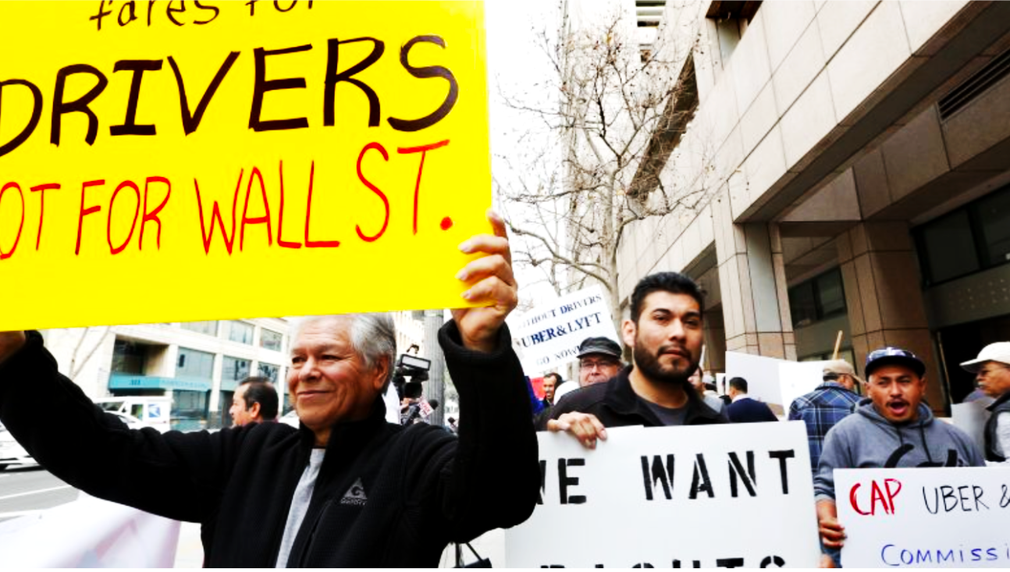Driver Organizer Bootcamp: Building Power, Winning for Drivers
Rideshare drivers are losing: money, flexibility, and peace of mind. Organizing together we’ve been able to push back and help each other. But to build capacity to make lasting change, we must organize broadly and deeply in the LA driving market with a majority of drivers. Driver Organizer Bootcamp will give a handful of long time, committed driver leaders the time to focus and develop skills to build the Los Angeles based movement: to change our working conditions and build a real driver voice around policies impacting us and our communities.

What is the primary issue area that your application will impact?
Income Inequality
In which areas of Los Angeles will you be directly working?
Central LA
East LA
San Gabriel Valley
San Fernando Valley
South LA
West LA
South Bay
Antelope Valley
County of Los Angeles
City of Los Angeles
In what stage of innovation is this project, program, or initiative?
Expand existing project, program, or initiative
What is your understanding of the issue that you are seeking to address?
As Lyft/Uber drivers of the greater LA area, we’ve seen the reality: our pay going down, year after year, our rights reducing. As full-time drivers, we work upwards of 60 hours a week, some of us experiencing homelessness and food insecurity, and with gas prices skyrocketing, we need relief. Companies are gouging customers while leaving drivers in poverty. Prop 22 literally holds us to wages below minimum wage. Numerous studies show our guaranteed wages are only $5.64/hr, 20% of us are making $0 after expenses, and our own study shows that drivers are less insured than Californians, and that Latinx & Black drivers suffer the most from lack of health insurance. Our answer is to build our own, powerful organization of app-based drivers to overcome the global push by app companies to destroy labor standards and silence workers’ voices. But as our pay continues to shrink, our capacity to organize does as well. We have to build in time and skills to organize driver power in greater LA.
Describe the project, program, or initiative this grant will support to address the issue.
Building our own, driver-led, powerful organization of app-based drivers is no easy task. As our wages constrict, so does our time and ability to continue to build to scale. We see many long-time drivers leaving the industry, while many new people come in. We are a volunteer organization of drivers, led by drivers. But to build to scale, and win real regulation in our city to prevent the poverty caused by these companies, we need to increase our capacity to organize: to find new drivers, to get them involved, to identify potential leaders and activists , and help them learn our organizing model and build power in the driver community to win improved wages and rights. Three main components of Bootcamp: 1. All Member Organizer Training: For all driver members coming into the organization. To be run by drivers organizer. Move 150 drivers to participate in the training during grant. 2. Develop 15 Pro-Level Driver Organizers: 10 drivers who represent the diversity in language, ethnicity, and geographic areas and show promise in organizing and leadership qualities, will participate in a full-time Boot Camp, skill building and mentoring to move hundreds of drivers into action, and develop skills to be long term full time organizers. 3. Culminate in Action! Trained members and driver organizers will come together to plan a campaign action to help move our goals of fair pay and a voice on the job within the greater LA Community with at least 500 drivers actively participating.
Describe how Los Angeles County will be different if your work is successful.
With app-based gig work expanding at an alarming rate in LA, and as we struggle to deal with income inequality, homelessness, and food insecurity in our larger community, winning rights and improvements for app-based drivers can help lead the way for a big group within our greater LA community to move forward.
What evidence do you have that this project, program, or initiative is or will be successful, and how will you define and measure success?
This would expand the work we do on a much smaller level with an eye towards building to the capacity needed to win improvements in LA. Currently we have two driver organizers who can run trainings and move actions, and a larger driver leader community of about 25, with more than 12000 driver members in the greater LA area. there are probably closer to 100,000 drivers in greater LA. We need to exponentially expand our ability to run trainings and actions to organize to scale and win changes.
Approximately how many people will be impacted by this project, program, or initiative?
Direct Impact: 175
Indirect Impact: 12,000